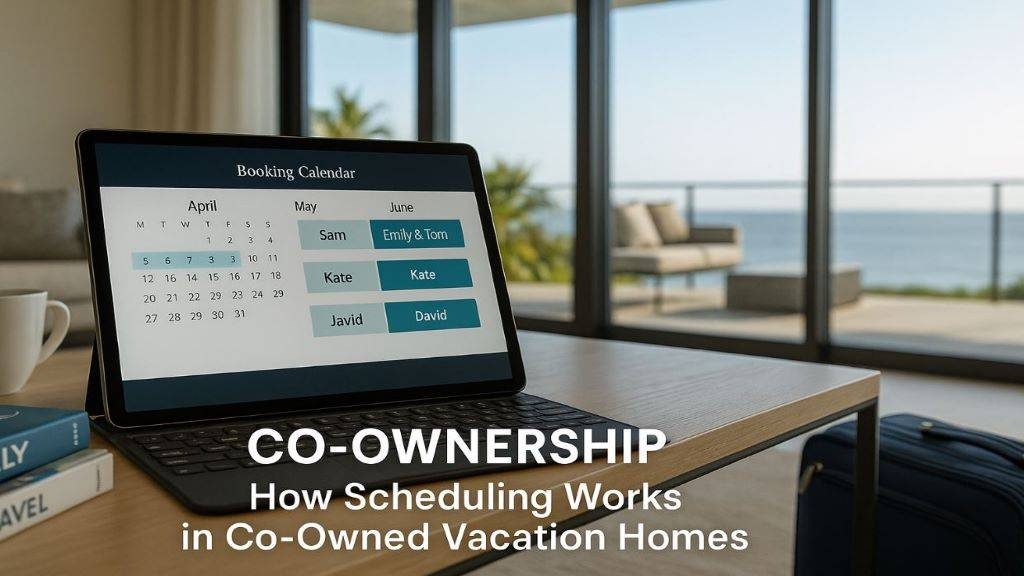One of the most frequent concerns potential fractional ownership buyers express is scheduling anxiety. “What if I can’t get the dates I want?” “Will I be fighting with other owners for prime time?” “How does it actually work when multiple people own the same property?” These are valid questions that deserve detailed answers. The reality is that modern fractional ownership companies have developed sophisticated systems that make scheduling far more seamless than most people imagine.
Understanding the Fractional Ownership Scheduling Framework
The Basics of Shared Usage Rights
Most fractional ownership properties limit ownership to 6-14 parties per unit, ensuring each owner has substantial usage rights. Unlike timeshares where you might be competing with dozens of other owners, fractional ownership typically involves a small group of co-owners who share similar interests in maintaining the property’s value and atmosphere.
Your usage rights are contractually guaranteed, typically ranging from 4-8 weeks annually depending on your ownership percentage. If you own 1/8 of a property, you’re entitled to approximately 6.5 weeks of usage per year, with the exact allocation determined by the scheduling system employed by your fractional ownership company.
Primary Scheduling Models
1. Rotating Priority System The most common and fairest approach involves rotating priority for booking prime dates. Here’s how it typically works:
- Each owner gets assigned a priority number that rotates annually
- Owner #1 this year gets first pick of all dates, Owner #2 gets second pick, and so on
- Next year, Owner #2 becomes #1, Owner #3 becomes #2, etc.
- This ensures everyone eventually gets first access to holidays, summer weeks, and other peak times
2. Points-Based Systems Some programs assign points to different time periods:
- Peak season weeks (holidays, summer) cost more points
- Shoulder season weeks cost moderate points
- Off-season weeks cost fewer points
- All owners receive the same annual point allocation
3. Fixed Week Plus Floating Time Hybrid systems might give each owner:
- One or two guaranteed fixed weeks annually
- Additional floating weeks chosen through the booking system
- This provides certainty for key vacation times while maintaining flexibility
Digital Booking Platforms: Technology Transforms Scheduling
Modern fractional ownership companies have invested heavily in user-friendly digital platforms that eliminate much of the traditional scheduling friction:
Real-Time Availability Systems
- 24/7 online access to booking calendars
- Real-time updates when dates become available
- Mobile apps for booking on-the-go
- Automatic notifications when desired dates open up
Advanced Booking Features
- Forward Booking: Reserve dates 12-18 months in advance
- Last-Minute Availability: Book empty weeks with just 48-72 hours notice
- Waitlist Functions: Automatically notify you when preferred dates become available
- Multi-Property Booking: Some companies allow booking across their entire portfolio
Communication Tools
- Owner directories for direct communication
- Integrated messaging for date swapping
- Group scheduling discussions for special events
- Automated reminders for booking deadlines
Peak Season Strategies: Getting the Dates You Want
Holiday and Summer Allocation
The biggest scheduling concern involves peak seasons. Professional fractional ownership companies handle this through several methods:
Fair Rotation Policies
- No owner can monopolize peak periods
- Major holidays rotate among owners annually
- Summer weeks are distributed fairly across the ownership group
- Documentation tracks historical usage to ensure equity
Early Bird Booking Windows
- Priority booking opens 12+ months in advance for following year
- Owners can secure key dates before general booking begins
- Special allocation rules for major holidays (Christmas, New Year’s, etc.)
- Written policies prevent any single owner from dominating prime time
Peak Season Premiums Some programs require additional fees for peak usage:
- Higher management fees during holidays
- Special assessments for peak season maintenance
- Premium pricing that naturally manages demand
- Revenue sharing with other owners who forgo peak times
Flexibility Features That Enhance Scheduling
Date Trading and Swapping
Most fractional ownership agreements include provisions for owners to trade usage periods:
- Direct Owner Trading: Negotiate swaps directly with other owners
- Platform-Facilitated Trading: Company-managed trading systems
- Banking Systems: “Store” unused weeks for future use
- Gifting Options: Share your weeks with family or friends
Last-Minute Availability Programs
- 48-Hour Booking: Access to otherwise empty periods
- Discounted Rates: Reduced fees for short-notice bookings
- Bonus Time: Additional days added to standard week bookings
- Spontaneous Getaway Alerts: Notifications when unexpected availability opens
Extended Stay Options
- Back-to-Back Booking: Reserve consecutive weeks when available
- Monthly Rentals: Extended stays during low-demand periods
- Seasonal Packages: Multiple weeks during shoulder seasons
- Long-Term Guest Privileges: Extended family and friends usage
Scheduling Best Practices for Fractional Owners
Plan Ahead
- Book your most important dates as early as possible
- Maintain flexibility with less critical vacation times
- Build relationships with fellow owners for trading opportunities
- Keep alternative date options in mind
Understand Your Ownership Group
- Learn other owners’ vacation patterns and preferences
- Identify potential trading partners with complementary schedules
- Participate in owner meetings and communications
- Respect shared spaces and community guidelines
Leverage Technology
- Set up automatic notifications for desired date availability
- Use mobile apps for quick booking when dates open
- Monitor last-minute availability for bonus trips
- Keep your calendar preferences updated in the system
What Happens When Conflicts Arise?
Even the best systems occasionally face scheduling conflicts. Professional fractional ownership companies typically provide:
Formal Resolution Processes
- Written escalation procedures for disputes
- Mediation services for serious conflicts
- Clear documentation of all scheduling decisions
- Appeal processes for unusual circumstances
Alternative Solutions
- Comparable Property Access: Some companies offer access to similar properties in their portfolio
- Financial Compensation: Credits or refunds for lost usage opportunities
- Priority Booking: Enhanced priority for following year
- Concierge Services: Help finding alternative vacation solutions
Red Flags: Scheduling Systems to Avoid
When evaluating fractional ownership opportunities, be wary of:
- Vague scheduling policies without written documentation
- Companies that don’t guarantee minimum annual usage
- Systems heavily favoring early investors over newer owners
- No clear conflict resolution processes
- Lack of digital booking platforms
- Hidden fees for peak season usage
- No provisions for trading or flexibility
The Reality Check: How Often Do Scheduling Problems Actually Occur?
Industry data suggests that scheduling conflicts in well-managed fractional ownership properties are relatively rare. Most issues arise from:
- Poor communication between owners
- Inadequate initial planning by owners
- Companies with poorly designed scheduling systems
- Properties with too many owners relative to available time
Professionally managed fractional ownership properties ensure that each owner has a say in significant decisions related to usage scheduling, and successful companies have refined their systems through years of experience.
Maximizing Your Scheduling Success
The key to scheduling satisfaction in fractional ownership lies in choosing the right property with the right management company. Look for:
- Transparent Policies: Clear, written scheduling rules
- Proven Technology: Robust digital booking platforms
- Owner Communication: Active community management
- Flexibility Options: Multiple ways to adjust your usage
- Track Record: History of satisfied owners and successful scheduling
Remember, as a co-owner, you’ll need to be cognizant of when the shared home is available, but this awareness typically becomes second nature within your first year of ownership.
Most fractional owners report that scheduling concerns that seemed significant before purchase prove to be minor inconveniences in practice. The key is setting realistic expectations, planning ahead, and working with a management company that has developed systems to serve their owners’ best interests.
When done right, fractional ownership scheduling provides more predictable access to vacation properties than rental markets, more flexibility than timeshares, and far less responsibility than whole ownership—creating the ideal balance for most vacation property users.





